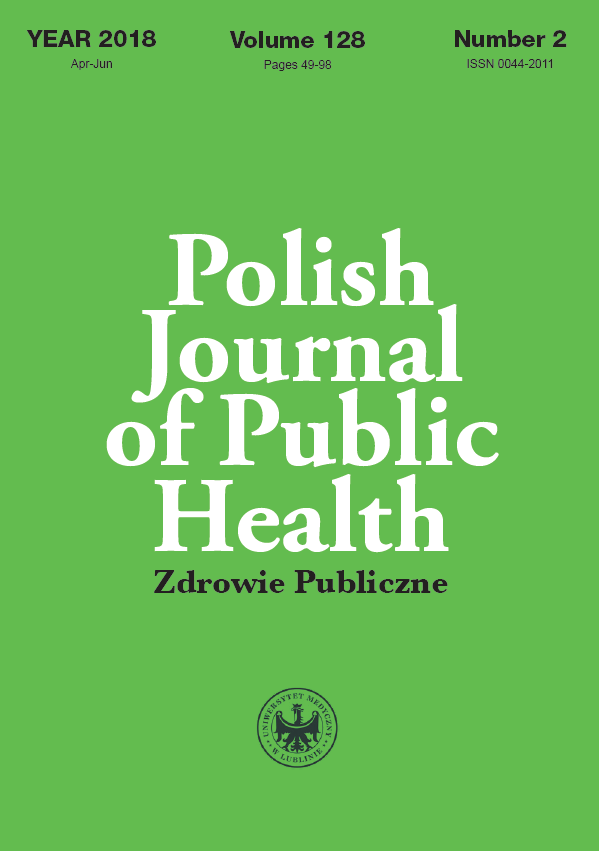Pharmaceutical care – a chance or necessity in the context of Polish self-medication
DOI:
https://doi.org/10.2478/pjph-2018-0017Keywords:
pharmaceutical care, self-medication, OTC medicinesAbstract
Independent Medical Sociology Unit, Faculty of Health Sciences, Medical University of Lublin, Poland
Introduction. The modern pharmaceutical care is supposed to meet numerous demands resulting from the presence and broad availability of OTC medicines. In this case the pharmacist becomes the primary advisor as for the application of medicines which are not prescribed by a doctor.
Aim. The aim of the study was to recognize the position of pharmacists employed in the pharmacy towards pharmaceutical care, possibilities to conduct it and barriers of its implementation.
Material and method. The researchers conducted a survey with elements of a questionnaire interview. The number of 186 pharmacists who work in pharmacies in the province of Lublin took part in the research.
Results. The surveyed perceive the benefits of performing pharmaceutical care: increased prestige of the profession, greater satisfaction with their job – 44.9% choices for each; increase of the effectiveness of pharmacotherapy (54.6%) and treatment (44.3%). The major barriers to introducing pharmaceutical care include insufficient education of pharmacists (33.7%) and lack of solid co-operation with the doctor (32.6%).
Conclusions. Pharmacists are aware of the importance of pharmaceutical care, although they identify a number of barriers which hinder its effective introduction.
References
1. Sansgiry SS, Bhansali AH, Bapat SS, Qingqing X. Abuse of over-the-counter medicines: a pharmacist’s perspective. Integr Pharm Res Pract. 2017;6:1-6.
2. Wazaify M, Shields E, Hughes CM, McElnay JC. Societal perspectives on over-the-counter (OTC) medicines. Fam Pract. 2005;22(2):170-6.
3. Piecuch A, Kozłowska-Wojciechowska M. Self-medication in Poland: the pharmacist’s advisory role in Warsaw. Int J Clin Pharm. 2013;35(2):225-9.
4. Bond C, Hannaford P. Issues related to monitoring the safety of over-the-counter (OTC) medicines. Drug Saf. 2003;26(15):1065-74.
5. Marie-Claire Van Hout, Norman I. Misuse of non-prescription codeine containing products: Recommendations for detection and reduction of risk in community pharmacies. Int J Drug Policy. 2016;27:17-22.
6. James E. Lessenger, Feinberg SD. Abuse of Prescription and Over-the- Counter Medications. J Am Board Fam Med. 2008;21(1):45-54.
7. Soller RW. Evolution of self – care with over the counter medications. Clinical Therapeutics. 1998;20(Suppl. C):134-40.
8. Wdowiak L, Lang B, Bojar I, et al. Self-medication – who buys OTC drugs in Poland? Zdr Publ. 2006;116(4):578-82.
9. CBOS, Leki dostępne bez recepty i suplementy diety. Warszawa; 2016. Nr 158/2016.
10. Wazaify M, Kennedy S, Hughes CM, McElnay JC. Prevalence of over-the-counter drug-related overdoses at Accident and Emergency departments in Northern Ireland – a retrospective evaluation. J Clin Pharm Therap. 2005;30:39-44.
11. Lipski S. O wzajemnych oddziaływaniach leków. Farm Pol. 2002;13:642- 7.
12. CBOS, Opinie o błędach medycznych i zaufaniu do lekarzy. Komunikat z badań. Warszawa; 2014. Nr 165/2014.
13. Okularczyk M, Brandys J. Promocja zdrowia jako element działalności aptekarzy. Farm Pol. 2002;58(15):734-9.
14. Waszyk-Nowaczyk M, Simon M. Znaczenie porady farmaceuty w proce¬sie samoleczenia się pacjentów. Farm Pol. 2009;65(11):772-4.
15. Łazowski J. Opieka farmaceutyczna. Część I. Uwagi wstępne. Farm Pol. 2001;57(11):503-10.
16. Olejniczak-Rabinek M. Opieka farmaceutyczna wyzwaniem nie tylko far¬maceutów. In: T. Malarczyk (ed). Zarządzanie wiedzą w regionie. Rola pielęgniarki w nowoczesnym leczeniu ran przewlekłych. Nysa: Oficyna Wydawnicza PWSZ; 2010. p.31-5.
17. Kotecki JE. Factors related to pharmacists’ over the counter recommenda¬tions. J Community Health. 2002;27(4):291-316.
18. Stożkowska W. Rola opieki farmaceutycznej w ochronie zdrowia. Farm Pol. 2002;58(11):523-6.
19. Ustawa o izbach aptekarskich. Dziennik Ustaw Nr 136 z 29 lipca 2008 r. poz. 856.
20. Wapniarska I, Stożkowska W. Rola farmaceutów w terapii chorób cywili¬zacyjnych. Farm Pol. 2005;61(12):569-74.
21. Ulatowska-Szostak E. Lekomania i nadużywanie leków w opiniach wybranej grupy fachowych pracowników aptek. Probl Higieny i Epide¬miol. 2006;87(suplement):36.
22. Latoszek M. Społeczna rola zawodu aptekarza na tle zastosowań opieki farmaceutycznej. Farm Pol. 2002;58(15):746-52.
23. Waszyk-Nowaczyk M, Simon M. Problemy związane z wdrażaniem opieki farmaceutycznej w Polsce. Farm Pol. 2009;65(10):713-5.
24. Iskierski J, Zimmermann A. Społeczna rola zawodu aptekarza w oczach własnych i pacjentów. Farm Pol. 2006;62(5):210-7.
25. Dulian K, Skrabalak M, Kamiński R, Stożkowska W. Edukacyjna rola far¬maceuty w farmakoterapii w świetle opinii pracowników aptek. Farm Pol. 2003;59(17):792-4.
26. Jankowski A, Bułaś L, Jaros K. Ocena realizacji opieki farmaceutycznej w aptekach regionu Podbeskidzia. Farm Pol. 2007;63(2):57-61.
Downloads
Published
Issue
Section
License
Copyright (c) 2018 Polish Journal of Public Health

This work is licensed under a Creative Commons Attribution-NonCommercial-NoDerivatives 3.0 Unported License.


